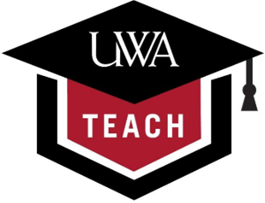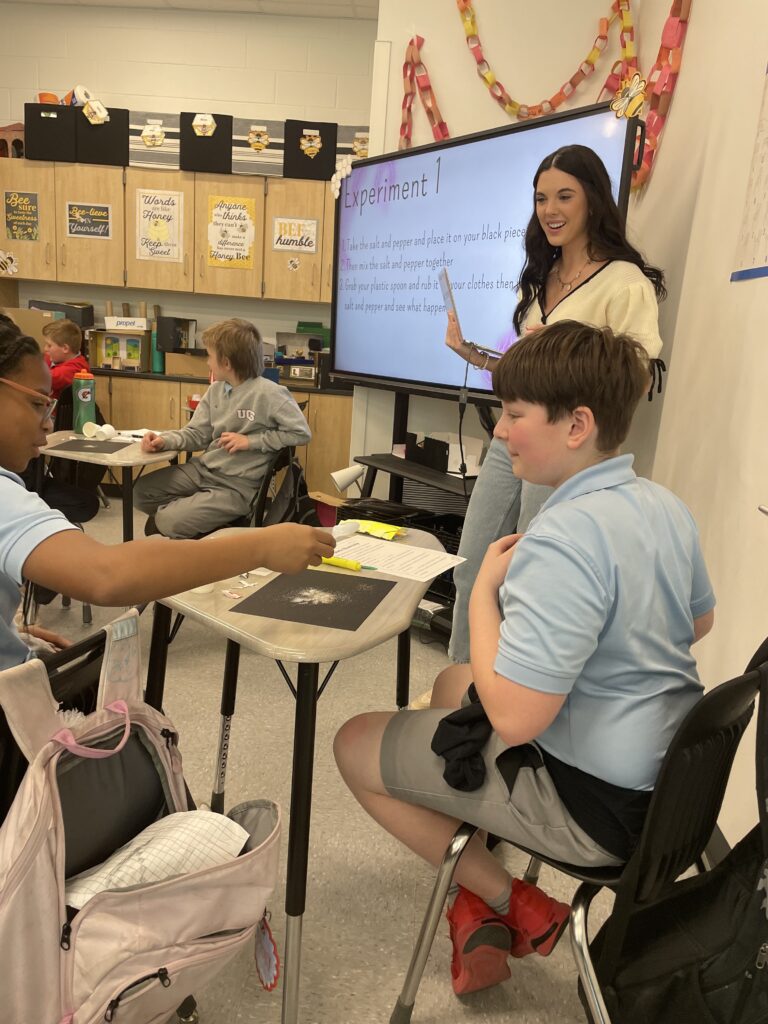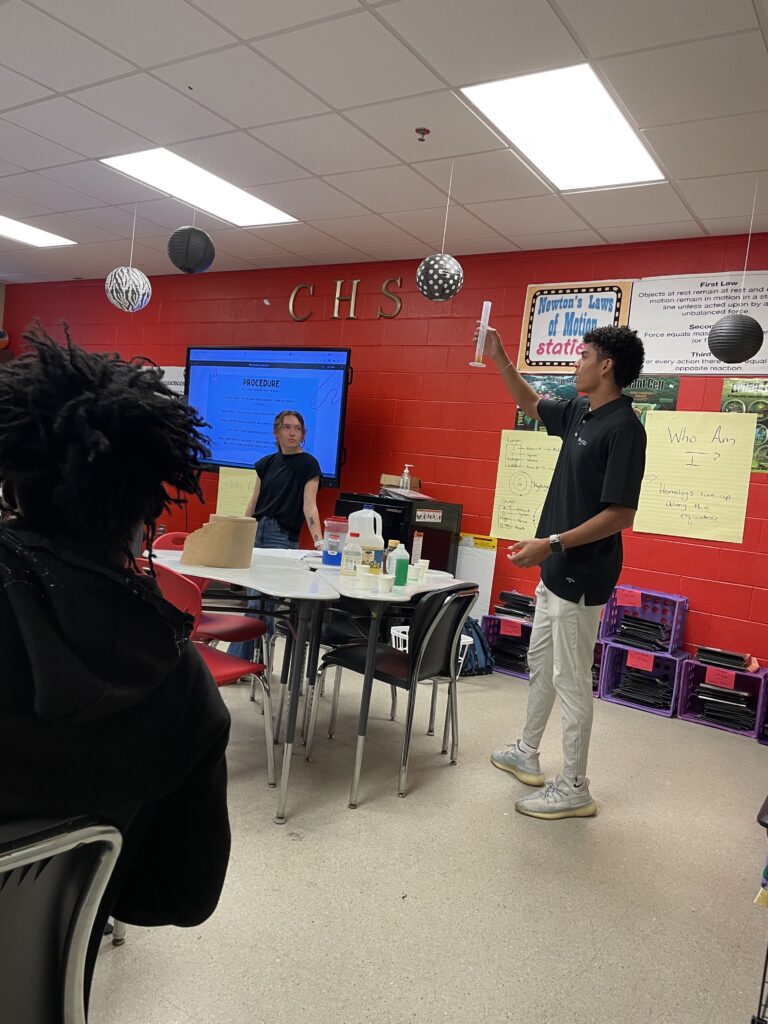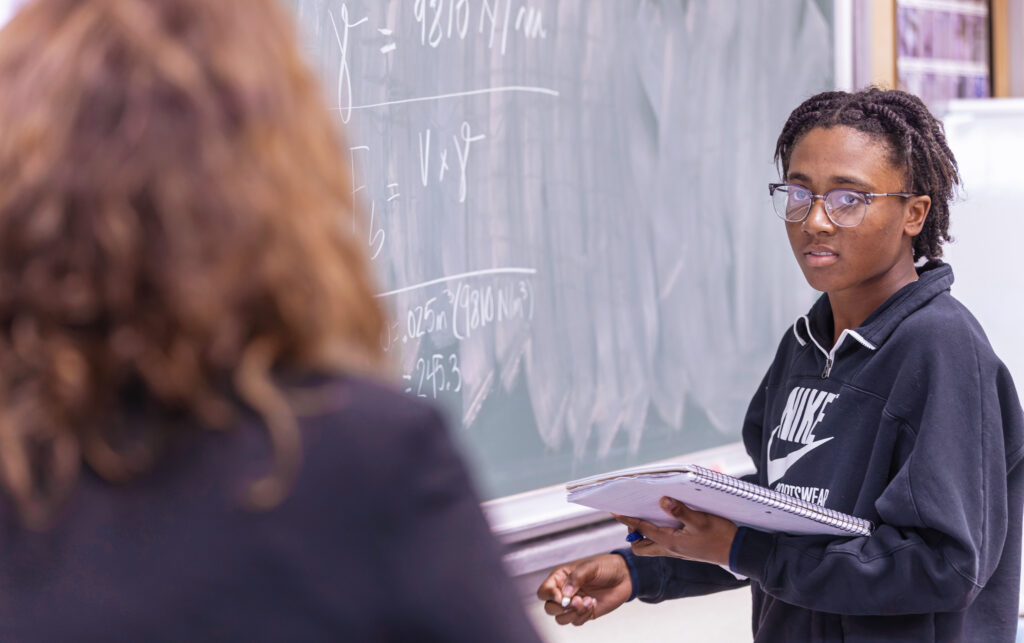
STEM Teaching is FREE!!
Think teaching might be for you? Determine if a teaching career in STEM education is a good fit by enrolling in the UWA-TEACH Program.
What is UWA-TEACH?
UWA-TEACH is a $3 million grant awarded by the Alabama Commission on Higher Education as part of the STEM Major Teacher Recruitment Initiative. It’s purpose is to address the Alabama teacher shortage in the areas of math and science.
UWA-TEACH is a collaborative effort between the College of Education and the College of Natural Science and Mathematics, offering a compact and flexible route to teacher certification. The program provides undergraduate students majoring in qualifying STEM majors with the opportunity to minor in STEM education. Students graduate with a STEM degree and are eligible to earn their teaching license upon successful completion of the edTPA and the Praxis content exam. This dual focus gives graduates two career options upon completion of the program: entering the STEM workforce or beginning a career in education.
In addition, the program is available to individuals who already hold a degree in mathematics or science and are seeking a master’s degree alongside a teaching certificate. This alternative route to certification offers a shorter and more streamlined path compared to traditional Alternative-A teacher certification programs.
Still unsure. . . .You have the opportunity to TRY it OUT!
Qualifying Majors
| Undergraduate | Earn Certification to Teach |
|---|---|
| Biology | Biology |
| Environmental Science | Biology |
| Conservation & Field Biology | Biology |
| Mathematics | Mathematics |
Curriculum
Undergraduate
SED 230: Inquiry Approach STEM (1 Credit)
This course allows students to explore teaching as a career. Following an introduction to the theory and practice behind excellent inquiry-based science and mathematics instruction, students teach lessons in elementary classrooms to obtain firsthand experience in planning and implementation.
SED 231: Inquiry Based Lesson Design (1 Credit)
This course offers students the opportunity to plan and teach inquiry-based science and mathematics lessons. Students will learn how to develop inquiry-based lessons and are required to teach these lessons to middle school students.
SED 330: Inq App Lesson Des STEM Teach (2 Credits)**
This course combines inquiry approaches to STEM teaching and inquiry based lesson design into a single course for select students. This course is primarily designed for seniors, but it can also be taken with special permission by college juniors.
SED 232: Know/Learn Math & Science (3 Credits)
The goal of this course is for students to construct the model of knowing and learning that they will take with them into their classroom. This course focuses on issues of what it means to know and learn science and mathematics, and students develop a powerful toolkit of relevant approaches.
ED 331: Classroom Interactions (3 Credits)
Students design and implement instructional activities informed by their own understandings of what it means to know and learn mathematics and science, and then evaluate the outcomes of those activities on the basis of student artifacts (i.e., what students say, do, or create). An important focus of Classroom Interactions is on building students’ awareness and understanding of equity issues and their effects on learning. The course introduces ways to use curricula and technologies in classroom settings to build relationships among teachers and students. Students learn how content and pedagogy combine for effective teaching. Field experience required.
SED 436: Functions and Modeling (3 Credits)*
Students engage in explorations and lab activities designed to strengthen and expand their knowledge of secondary mathematics topics. Students collect data and explore a variety of situations that can be modeled using linear, exponential, polynomial, and trigonometric functions.
SED 435: Science Research Methods (3 Credits)**
Research Methods simultaneously provides students specific techniques needed to address scientific questions and examples of how to provide this sort of training for students through individualized instruction. The course involves extensive laboratory work and scientific writing.
SED 332: Project Based Instruction (3 Credits)
Students develop an intellectually challenging project-based instructional unit that provides students with the experience of managing lessons and high school students outside a classroom, in a field setting. Integration of mathematics and science content, infusion of technology in representation, analysis, modeling, assessment, and contextualization of content with a focus on designing equitable learning environment are synthesized as students develop an intellectually challenging project-based instructional unit. Field experience is required.
SED 459: Apprenticeship in STEM Teach (6 Credits)
The purpose of the STEM Teaching Internship course is to offer students a culminating experience that provides them with the tools needed for their first teaching position. In STEM Teaching, students are immersed in the expectations, processes, and rewards of teaching. They remain on the school campus a minimum of six hours per day and must complete the STEM Teaching Seminar Course concurrently.
SED 430: STEM Teaching Seminar (1 Credits)
The STEM Teaching seminar provides a supportive environment where STEM intern teachers share their experiences and work on solutions to problems they may be experiencing.
*Mathematics majors
**Biology and General Science majors
All Students who start the program in a spring semester will start with Step Combo, SED 330
SED 230 (Step 1) and SED 231 (Step 2), OR SED 330 (Combo) qualify for a tuition rebate if the course is completed with at least a C or above.
STEM Major Coursework
You must also successfully complete the required courses for your chosen STEM field. These requirements are listed in the University of West Alabama catalog.
The UWA-Teach Flexible Entry Point matrix outlines the recommended sequence of courses for students entering the UWA-Teach program at various stages in their academic journey. Whether starting as a freshman, sophomore, or junior, this guide helps students stay on track to complete all teaching certification requirements while allowing for flexibility in scheduling.
See the UWA-Teach Flexible Entry Point Matrix.
Alternative A Route
Biology Curriculum
- *SED 530: Inquiry Application Lesson Design in STEM Teaching
- *SED 532: Knowing & Learning
- SED 533: Classroom Interactions
- SED 534: Project-Based Instructions
- SED 535: Science Research Methods
- Eighteen (18) Hours of Approved Graduate Electives in Biology in conjunction with any of the above
- SE 500: Introduction to Special Education (If the course was completed prior to unconditional admission to the Alt-A program, another approved diversity course is required.)
General Science Curriculum
- *SED 530: Inquiry Application Lesson Design in STEM Teaching
- *SED 532: Knowing & Learning
- SED 533: Classroom Interactions
- SED 534: Project-Based Instructions
- SED 535: Science Research Methods
- BY 580: Advanced Genetics & EN 555: Ecological Management
- Twelve (12) Hours of Approved Graduate Electives in Science in conjunction with any of the above
- SE 500: Introduction to Special Education (If the course was completed prior to unconditional admission to the Alt-A program, another approved diversity course is required.)
Mathematics Curriculum
- *SED 530: Inquiry Application Lesson Design in STEM Teaching
- *SED 532: Knowing & Learning
- SED 533: Classroom Interactions
- SED 534: Project-Based Instructions
- SED 536: Functions and Modeling
- Eighteen (18) Hours of Approved Graduate Electives in Mathematics** in conjunction with any of the above
- SE 500: Introduction to Special Education (If the course was completed prior to unconditional admission to the Alt-A program, another approved diversity course is required.)
*Note: SED 530 and SED 532 must be taken first in order to satisfy prerequisite requirements for other UWA-Teach courses. These two courses can be taken at the same time or alongside any other major-specific courses; however, they must be completed prior to enrolling in any of the other UWA-Teach courses.
Contact
Roxcanna Bradley
UWA-Teach@uwa.edu
Lyon Hall Room B 119




